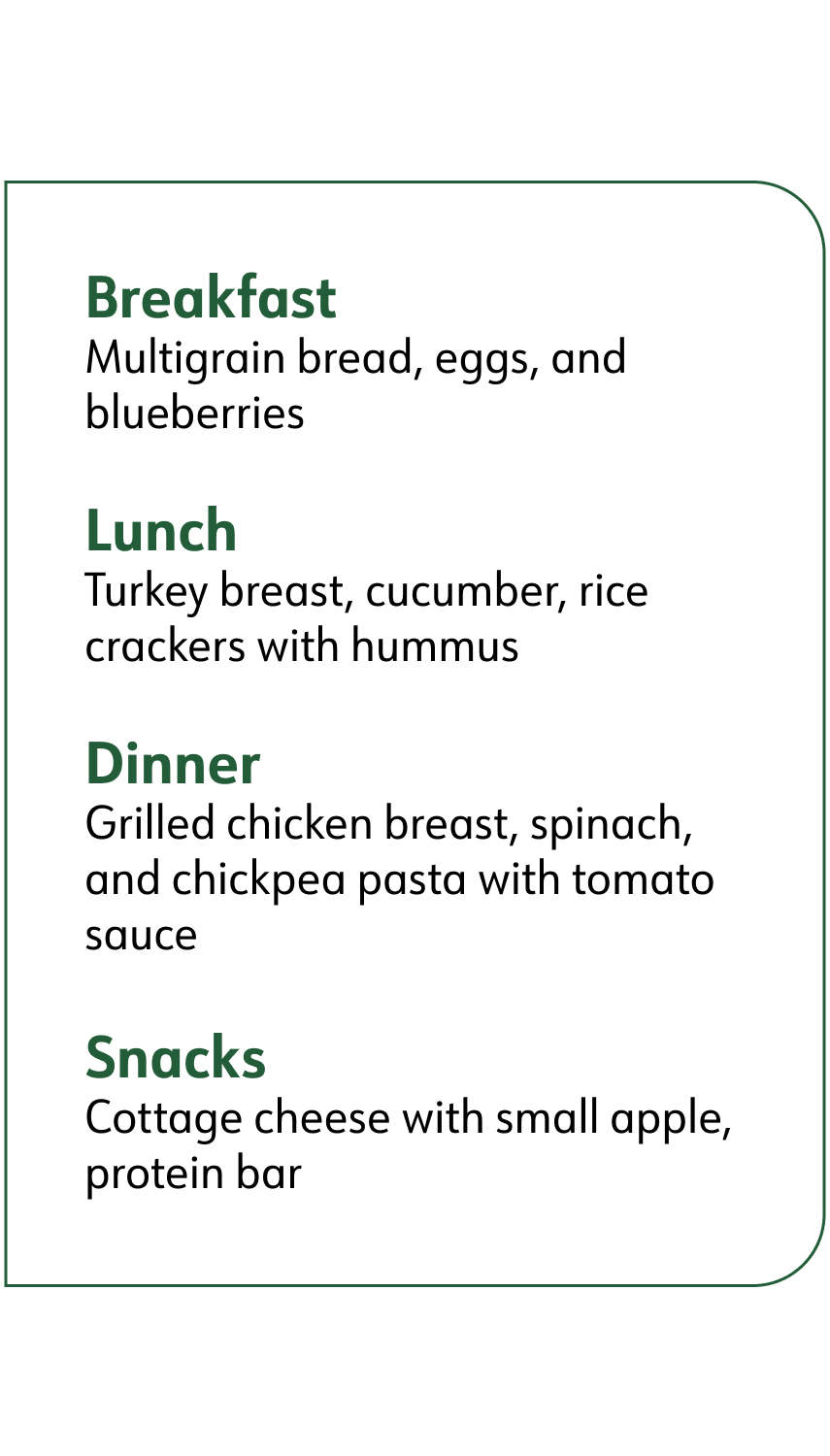Plans & Pricing | WW USA
- Access to the science-backed program that fits your needs
- 12,000+ recipes for healthier meal inspiration
- 200+ no-track ZeroPoint® foods
- New What to Eat feature, barcode scanner, and restaurant search in our easy-to-use app
- Supportive members-only digital community
- 1:1 check-ins with a board-certified clinician
- Dedicated support to maximize insurance coverage and cost savings
- Flexible plans proven to help you lose 15% of your body weight*
- Access to FDA-approved weight-management medications, including GLP-1s
*Based on 5,377 members who have been on WeightWatchers + Medication Access program for at least 26 weeks. Average reported body weight lost was 15.17% and the top quartile lost an average of 19.90% of body weight.
What a day on WeightWatchers looks like
There's no one “right way” to eat on WW. Take it from our members!
Frequently asked questions
We help you lose weight and build healthy habits, one small step at a time. Fad weight-loss diets can be restrictive, and rarely work long term. We have more than 140 publications that show WeightWatchers’ efficacy to help members lose weight and keep it off, and we’ve been ranked the #1 Best Diet for Weight Loss by U.S. News & World Report for 13 years in a row.††
See how WeightWatchers stacks up against the competition.
†† U.S. News & World Report ranked WW the #1 Best Diet for Weight Loss for 13 years in a row (2011–2023).
Our updated, simplified weight-loss program makes it easier for you to follow and find success. Every member gets a tailored Points Budget and streamlined list of over 200 ZeroPoint foods. Compared to programs of the past, we now use advanced nutrition science to factor in more food label data, like added sugars, fiber, and unsaturated fats, to guide you toward the healthiest foods.
What you eat is up to you—and we’ll show you how to enjoy your favorite foods in a way that gets you to your goals. With WeightWatchers, there are no “good” or “bad” foods—just nutritious and less nutritious ones.
We make it as easy as possible. You’ll get a Points® Budget to “spend” however you want. You’ll track your meals, drinks, and snacks in the WW app and enjoy as many ZeroPoint™ foods as you'd like. Activity can also boost your weight loss (vs. only focusing on food)ᶿᶿ.
ᶿᶿ Johns DJ, Hartmann-Boyce J, Jebb SA, Aveyard P; Behavioural Weight Management Review Group. Diet or exercise interventions vs combined behavioral weight management programs: a systematic review and meta-analysis of direct comparisons. J Acad Nutr Diet. 2014;114(10):1557–1568. doi:10.1016/j.jand.2014.07.005
ᶿDF Tate et al, 12-month randomized multi-country trial comparing weight loss between the WW program to a Do-It-Yourself approach where resource guides were provided. JAMA Network Open. 2022;5(8):e2226561. Funded by WW International, Inc.
Our team includes nutrition and behavioral scientists, registered dieticians, clinical researchers, and more. Together they help you overcome common weight-loss hurdles—like stress-eating or late-night snacking—while our exclusive Points system makes nutrition easier—so easy that healthier eating will feel like second nature. After you sign up, you’ll answer a few questions to get a plan customized for you, and build healthy habits with proven behavior change techniques.
We know living with diabetes is challenging. Our diabetes-tailored plan for weight loss helps you lower blood sugar^^, lose weight, and stress less**. Plus, we’ve added a new in-app blood sugar tracker.
^^Based on a 6-month multicenter trial. Apolzan JW, et al. A Scalable, Virtual Weight Management Program Tailored for Adults (n=136) with Type 2 Diabetes: Effects on Glycemic Control. Presented at American Diabetes Association’s 82nd Scientific Sessions. 2022.
**Based on a 6-month multicenter study demonstrating significant reductions in diabetes-related distress. Apolzan JW, et al. A Scalable, Virtual Weight Management Program Tailored for Adults with Type 2 Diabetes: Effects on Glycemic Control. Presented at American Diabetes Association’s 82nd Scientific Sessions. 2022.
GLP-1s are prescription medications that mimic a naturally occurring hormone called glucagon-like peptide 1.1 They were originally used to help control blood sugar and manage type 2 diabetes, but they have also been found to lead to weight loss.1 That’s because GLP-1s target receptors in your brain and your gut, which reduce your appetite, slow down how fast you digest food, and help you feel full longer.2 As a result, you eat less.
At the moment there are three GLP-1s approved by the FDA for weight management: liraglutide (Saxenda), semaglutide (Wegovy), and tirzepatide (Zepbound).3-5 Liraglutide is a first-generation GLP-1 and is taken daily while semaglutide and tirzepatide are second-generation GLP-1s and are taken weekly. The GLP-1 Companion Program is designed for those taking second-generation GLP-1s. The amount of weight you can lose on a GLP-1 can range from 5% to over 20% depending on which medication you’re taking, with newer second-generation medications like Wegovy, Ozempic and Mounjaro showing more weight loss, compared to first-generation GLP-1s.6,7
- Cleveland Clinic. GLP-1 Agonists. Last reviewed July 3, 2023. Accessed September 12, 2023.
- U.S. Department of Health and Human Services. Prescription medications to treat overweight & obesity - NIDDK. National Institute of Diabetes and Digestive and Kidney Diseases. March 2023; Accessed September 12, 2023.
- Drugs.com FDA approves saxenda. Posted December 2014, Accessed September 12, 2023.
- Drugs.com FDA approves Wegovy. Posted June 2021, Accessed September 12, 2023.
- https://investor.lilly.com/news-releases/news-release-details/fda-approves-lillys-zepboundtm-tirzepatide-chronic-weight
- Jastreboff et al. Tirzepatide once weekly for the treatment of obesity. N Engl J Med 2022; 387:205-216
- Chakhtoura M, Haber R, Ghezzawi M, et al. Pharmacotherapy of obesity: an update on the available medications and drugs under investigation. eClinicalMedicine. 2023;58:101882.
No. Medical decisions, such as which (if any) prescription weight-management medication may be best for you, should be discussed between you and your healthcare provider. If you don’t have a provider, you can become a member of our telehealth clinic Sequence and speak to a licensed clinicians to learn more about your options.
While it is ultimately up to a health care provider to determine who is eligible, the FDA has approved weight-management medications like GLP-1s for individuals living with obesity, which is defined as having a body mass index (BMI) of 30 or above. They are also approved for people with a BMI of 27 and above as well as a weight-related health condition (type 2 diabetes, high blood pressure, high cholesterol, and others.)1
- U.S. Department of Health and Human Services. Prescription medications to treat overweight & obesity - NIDDK. National Institute of Diabetes and Digestive and Kidney Diseases. March 2023; Accessed September 12, 2023.
All medications, including those designed for weight loss, have the potential for side effects. The side effects can vary depending on the medication and dose, but for weight-loss medications–especially the newer GLP-1s–they tend to be mild and improve as you continue taking the medication. The most common side effects include GI issues (nausea, diarrhea, vomiting, constipation, stomach pain), headaches or dizziness, and sleep disturbances.1-3 As always, discuss the possible side effects with your healthcare provider before starting a new medication or modifying the dosage so that you know what to expect.
- U.S. Department of Health and Human Services. Prescription medications to treat overweight & obesity - NIDDK. National Institute of Diabetes and Digestive and Kidney Diseases. March 2023; Accessed September 12, 2023.
- Ozempic. Frequently Asked Questions: What are the most common side effects of Ozempic. Accessed Sept 13, 2023.
- Mounjaro. Possible side effects. Accessed Sept 13, 2023.
While prescription weight-management medications reduce your appetite so that you eat less, they are designed to work best when paired with a healthy lifestyle, including an improved diet, regular physical activity, reduced stress, and plenty of sleep. (These lifestyle changes are even included in the usage instructions that come with the medications.) By combining weight-management medication with these healthy habits, you’re prioritizing your overall well-being and ensuring you have the tools and skills needed to maintain your weight loss in the future.1
- U.S. Department of Health and Human Services. Prescription medications to treat overweight & obesity - NIDDK. National Institute of Diabetes and Digestive and Kidney Diseases. March 2023; Accessed September 12, 2023.
It depends on the medication and the type of insurance you have. Newer generation medications like GLP-1s can be very expensive ($900-$1200 a month in the U.S. if you’re paying out-of-pocket), and insurance companies vary greatly on which medications they cover, if any.
WW is the #1 Doctor-Recommended Weight-Loss Program.♢♢
♢♢Based on a 2020 IQVIA survey of 14,000 doctors who recommend weight-loss programs to patients.
††U.S. News & World Report ranked WW the #1 Best Diet for Weight Loss for 13 years in a row (2011–2023).
ᶿTate DF, Lutes LD, Bryant M et al. Efficacy of a Commercial Weight Management Program: A Randomized Multi-Country Controlled Trial. JAMA Network Open. Accepted. June 2022.



